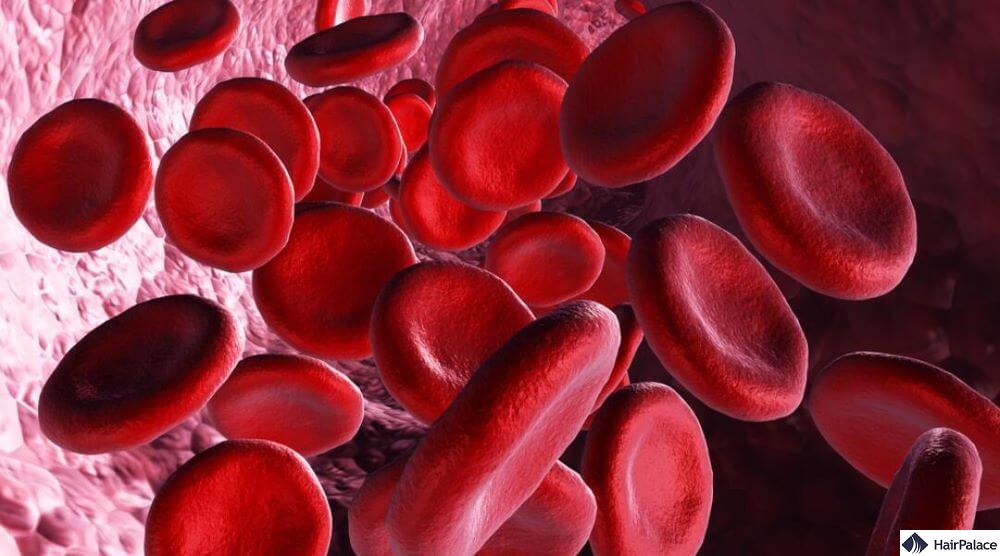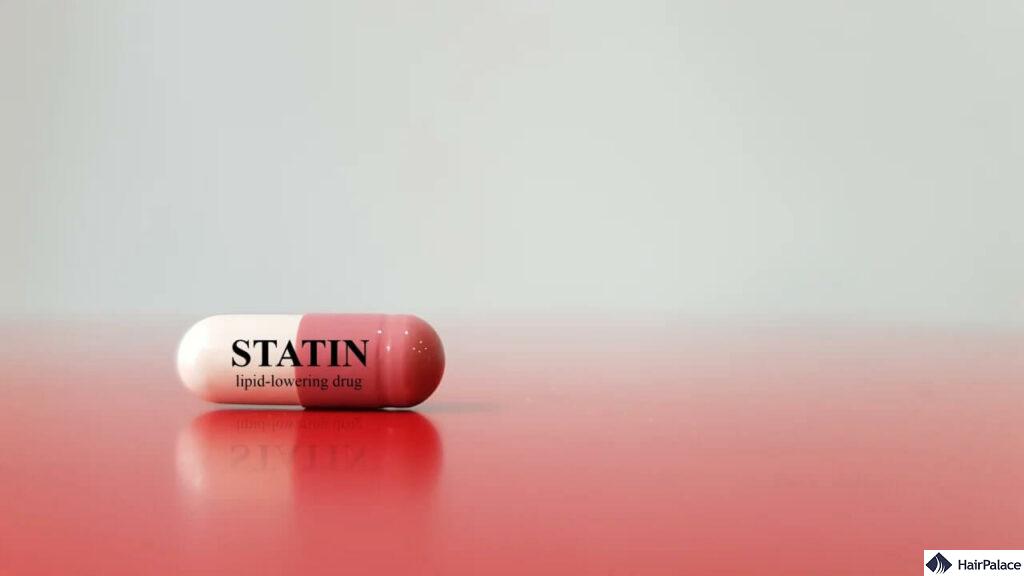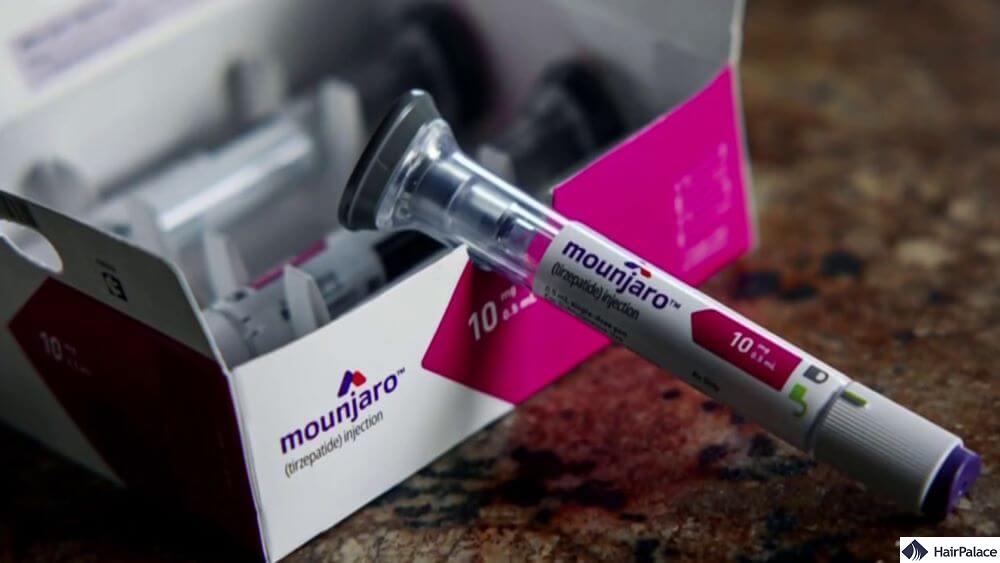What Are The Medications That Cause Hair Loss?

Hair loss can be a distressing experience, especially when it seems to occur without a clear reason.
While genetics, stress, and health conditions are often culprits, medications you take to manage various medical issues may also play a role.
Certain drugs, while vital for treating conditions like high blood pressure, depression, or chronic pain, can disrupt the natural hair growth cycle, leading to thinning hair.
This article explores the common medications associated with hair loss, how they affect hair health, and what you can do if you suspect your prescription is the cause.
Understanding the link between medications and hair loss can help you make informed decisions about your treatment options while maintaining your confidence and well-being.
The TOP 15 medications that cause hair loss
1. Anticoagulants (Blood Thinners)

Anticoagulants prevent blood clots by reducing the blood’s ability to form clots.
They are commonly prescribed for individuals at risk of conditions like stroke, deep vein thrombosis (DVT), pulmonary embolism, or certain heart disorders like atrial fibrillation.
These medications may interfere with the hair growth cycle, specifically triggering a condition known as telogen effluvium which leads to noticeable hair shedding.
Long-term use of some anticoagulants can also lead to vitamin deficiencies, which might indirectly affect hair health.
Lastly, some anticoagulants may directly affect cellular processes or nutrient absorption, resulting in weaker hair shafts and increased shedding.
2. Cholesterol-Lowering Drugs

Cholesterol-lowering drugs, such as statins, reduce the levels of low-density lipoprotein (LDL) cholesterol (“bad cholesterol”) in the blood.
These medications help prevent cardiovascular diseases like heart attacks and strokes by inhibiting cholesterol production in the liver.
Statins may deplete levels of essential nutrients like coenzyme Q10 (CoQ10), which is involved in cellular energy production.
CoQ10 depletion can impact hair follicle health and impede new hair growth.
Cholesterol is a precursor for producing several hormones that influence scalp hair growth.
Lowering cholesterol levels too much can affect hormonal balance, potentially leading to hair loss.
3. Beta-Blockers

Beta-blockers are medications used to treat various cardiovascular conditions, such as high blood pressure (hypertension), angina, arrhythmias, and heart failure.
They work by blocking the effects of adrenaline (epinephrine) on beta receptors in the heart and blood vessels, slowing the heart rate and reducing blood pressure.
Beta-blockers lower blood pressure and heart rate, reducing blood flow to peripheral areas of the body, including the scalp.
This diminished blood circulation can deprive hair follicles of essential nutrients and oxygen, weaken them, and contribute to hair thinning.
While beta-blockers reduce the effects of adrenaline, the adjustment in hormone regulation may contribute to imbalances that affect hair growth, especially in sensitive individuals.
Additionally, they can also alter the body’s physiological balance and the stress of adapting to the medication may manifest as hair shedding.
4. Hormonal Medications

Hormonal medications that cause hair loss are treatments that alter hormone levels in the body.
They are used for various purposes, including contraception, hormone replacement therapy (HRT), fertility treatments, and managing hormone-related conditions like menopause or androgenic disorders.
Hormones regulate the hair growth cycle. Medications that alter hormone levels, such as estrogen, progesterone, or testosterone, can disrupt this balance. For instance:
- Increased levels of androgens (male hormones) can induce hereditary hair loss.
- Fluctuations in estrogen can shorten the anagen (growth) phase of the hair cycle, leading to excessive shedding.
Some women taking oral contraceptives may experience hair loss if they are sensitive to androgens or if the contraceptive contains high androgenic activity progestins.
It can also worsen certain conditions such as polycystic ovary syndrome (PCOS) or thyroid dysfunction, which are linked to hair loss.
Similarly, testosterone therapy in men can increase dihydrotestosterone (DHT) levels, leading to male-pattern baldness.
5. Acne Medications
Acne medications are treatments designed to reduce acne symptoms by addressing underlying causes such as clogged pores, bacterial infections, inflammation, or excessive oil production.
They range from topical solutions to oral medications. Common examples include Isotretinoin (Accutane), topical retinoids, and antibiotics.
Accutane is known to cause hair loss by affecting the hair’s growth cycle and leading to a dry and irritated scalp.
High doses of this medication can also reduce nutrient absorption, especially of vitamins essential for healthy hair.
6. Antidepressants

Used for treating depression, anxiety, and related mental health conditions by altering neurotransmitter levels in the brain, such as serotonin, norepinephrine, or dopamine.
This can indirectly affect the hair growth cycle by influencing hormonal balance and stress response systems.
While antidepressants treat mental health conditions, the stress of initiating or changing medication can temporarily trigger hair shedding, especially if the body takes time to adapt to the drug.
Some antidepressants may reduce the absorption of nutrients essential for hair health, such as B vitamins and zinc. Over time, these deficiencies can weaken hair follicles.
SSRIs like Fluoxetine (Prozac) and Sertraline (Zoloft) are commonly linked to hair loss in sensitive individuals.
Tricyclic antidepressants like Amitriptyline may also contribute to hair thinning, although less frequently.
7. Antifungal Medications

Antifungal medications treat fungal infections of the skin, nails, mucous membranes, and internal organs.
They work by disrupting the fungal cell membrane or other cellular processes. These medications can be topical (creams, shampoos), oral, or intravenous.
Topical antifungal treatments, such as Ketoconazole shampoos, can sometimes cause scalp irritation, dryness, or flaking. These conditions may weaken hair follicles and lead to breakage or thinning.
Certain medications may also alter keratin production or nutrient metabolism, increasing hair loss.
Long-term oral antifungals may affect the body’s ability to absorb essential nutrients like biotin, zinc, or iron, which are crucial for healthy hair growth.
8. Anticonvulsants (used for seizures or mood stabilization)

Anticonvulsants are medications that cause hair loss. They are primarily used to prevent or control seizures in conditions like epilepsy.
They are also prescribed for mood stabilization in psychiatric disorders such as bipolar disorder.
These drugs work by modulating electrical activity in the brain to reduce abnormal excitability.
However, they also lead to nutrient deficiency, specifically in biotin, zinc, selenium, and folate, which are crucial for maintaining adequate hair growth.
The conditions treated by anticonvulsants, such as epilepsy or bipolar disorder, may themselves contribute to stress-related hair loss.
The introduction of medication might exacerbate this temporarily.
9. Chemotherapy Drugs

These are powerful medications used to treat cancer by targeting rapidly dividing cells.
While effective against cancerous cells, these drugs also affect healthy rapidly dividing cells, such as those in hair follicles, bone marrow, and the digestive tract.
Chemotherapy drugs inadvertently damage hair follicle cells, which are among the most rapidly dividing cells in the body, leading to anagen effluvium.
This means sudden and widespread hair loss which occurs in the growth phase of the hair cycle.
Chemotherapy also interrupts the function of the hair matrix cells, which are responsible for producing hair shafts.
The systemic impact of chemotherapy, including immune suppression and nutrient depletion, further affects hair follicles’ ability to maintain normal function and growth.
10. Immunosuppressants

Immunosuppressants are medications that reduce or suppress the activity of the immune system.
They are commonly prescribed to prevent organ transplant rejection, treat autoimmune diseases (e.g., rheumatoid arthritis, lupus, psoriasis), and manage inflammatory conditions.
Some immunosuppressants, like Methotrexate, inhibit cell division.
This can interfere with the rapidly dividing cells in hair follicles, weakening their structure and function, and causing hair to thin or fall out.
Certain immunosuppressants may indirectly affect hormone levels or other biochemical pathways that regulate hair growth, contributing to thinning.
Long-term use of immunosuppressants can reduce the absorption or levels of nutrients essential for hair health, such as folic acid, zinc, and iron.
11. Blood Pressure Medications

Blood pressure medications, or antihypertensives, are prescribed to lower high blood pressure (hypertension) and prevent complications such as stroke, heart attack, and kidney disease.
These medications belong to various classes, including beta blockers, ACE inhibitors, angiotensin II receptor blockers (ARBs), calcium channel blockers, and diuretics.
This condition causes more hair follicles to shift prematurely into the resting phase, resulting in diffuse hair shedding. The hair loss typically begins 2-3 months after starting the medication.
Beta-blockers like Metoprolol and Atenolol lower heart rate and blood pressure, which can reduce blood flow to peripheral areas, including the scalp.
This can deprive hair follicles of oxygen and essential nutrients leading to medication-induced hair loss.
Diuretics, such as Hydrochlorothiazide and Furosemide, can also lead to the loss of essential nutrients like zinc, magnesium, and potassium.
Long-term use of diuretics can cause hair to become brittle and prone to shedding.
12. Anti-Thyroid Drugs

Anti-thyroid drugs are medications used to treat hyperthyroidism (an overactive thyroid gland) by reducing the production of thyroid hormones.
Common conditions treated include Graves’ disease and toxic nodular goitre.
These medications work by interfering with thyroid hormone synthesis or reducing thyroid gland activity.
Hyperthyroidism itself is a common cause of hair thinning or shedding.
While anti-thyroid drugs aim to correct the hormone imbalance, the adjustment period can temporarily exacerbate hair loss until hormone levels stabilize.
Graves’ disease and other autoimmune-related thyroid disorders can cause the immune system to attack hair follicles, which may not immediately resolve even with treatment.
Prolonged use of anti-thyroid drugs can lead to deficiencies in zinc, selenium, and other nutrients crucial for hair health, especially if dietary intake is insufficient.
13. Weight Loss Medications

Weight loss medications, also known as anti-obesity drugs, are designed to help individuals lose weight by suppressing appetite, increasing metabolism, or preventing fat absorption.
These medications are typically prescribed for people with obesity or weight-related health issues like diabetes or hypertension.
Many weight loss medications, especially absorption inhibitors, can interfere with the absorption of fat-soluble vitamins (A, D, E, K) and essential nutrients such as zinc and iron.
Weight loss medications, such as mounjaro, can cause changes in hormones like thyroid or sex hormones, which play a role in regulating the hair growth cycle.
Obesity, weight-related health conditions, and the stress of adhering to a weight loss regimen can exacerbate hair loss and balding independently of the medications.
14. NSAIDs (Nonsteroidal Anti-inflammatory Drugs)

NSAIDs are medications commonly used to reduce inflammation, pain, and fever.
They work by inhibiting enzymes (COX-1 and COX-2) that produce prostaglandins, substances responsible for inflammation and pain.
NSAIDs may alter immune system activity, which could inadvertently affect hair follicle health.
This is particularly relevant for individuals prone to autoimmune conditions like alopecia areata, where the immune system attacks hair follicles.
Long-term use of NSAIDs can sometimes cause gastrointestinal irritation or ulcers, potentially reducing the absorption of essential nutrients like iron or zinc.
Some individuals may experience hair loss as a rare side effect of specific NSAIDs due to their sensitivity to the drug or its metabolites.
15. Parkinson’s Disease Medications
Parkinson’s disease medications are designed to manage symptoms of Parkinson’s by improving dopamine levels in the brain or mimicking dopamine’s effects.
Common classes include dopaminergic drugs, dopamine agonists, and monoamine oxidase-B (MAO-B) inhibitors.
By altering dopamine levels, Parkinson’s drugs can indirectly impact hormonal balances that influence hair growth, potentially leading to increased shedding.
The physiological and emotional stress of living with Parkinson’s disease, combined with the impact of medications, can exacerbate hair loss through stress-related mechanisms.
Drug induced hair loss treatments
While most of the medications that cause hair loss mentioned above only lead to temporary loss, there are ways you can promote faster hair regrowth. Common treatment approaches include:
- Dietary Adjustments: Eat a balanced diet rich in whole foods, lean proteins, leafy greens, nuts, and seeds.
- Supplements: Replace any nutrients depleted by the drug, by taking biotin, zinc, B or D vitamins as needed.
- Minoxidil (Rogaine): A proven over-the-counter treatment that stimulates hair follicles and encourages regrowth.
- Scalp Serums: Look for ingredients like caffeine, peptides, or essential oils (e.g., rosemary oil) to improve scalp circulation and health.
- Ketoconazole Shampoo: An antifungal shampoo that can also reduce inflammation and support healthier hair.
- Massage the Scalp: Regular scalp massages improve blood flow to hair follicles, promoting growth.
- Platelet-Rich Plasma (PRP) Therapy: A procedure where plasma from your blood is injected into the scalp to stimulate hair growth.
- Hair Transplant Surgery: Suitable for severe or irreversible hair loss, though it’s typically not needed for drug-induced cases.
- Low-Level Laser Therapy (LLLT): A non-invasive treatment that uses light to stimulate hair follicles.
In certain cases, it can be beneficial to switch to a different medication that doesn’t lead to such adverse effects.
However, you should always consult with your doctor first before switching medications or altering your treatment plan.
Last medically reviewed on April 25th, 2025
- Koyama T, Kobayashi K, Hama T, Murakami K, Ogawa R. Standardized Scalp Massage Results in Increased Hair Thickness by Inducing Stretching Forces to Dermal Papilla Cells in the Subcutaneous Tissue. Eplasty. 2016 Jan 25;16:e8.https://www.ncbi.nlm.nih.gov/pmc/articles/PMC4740347/
- Buffoli B, Rinaldi F, Labanca M et al. The human hair: from anatomy to physiology. Int J Dermatol 2014;53: 331–341https://doi.org/10.1111/ijd.12362
- Williamson, D., Gonzalez, M. and Finlay, A. (2001), The effect of hair loss on quality of life. Journal of the European Academy of Dermatology and Venereology, 15: 137-139.https://doi.org/10.1046/j.1468-3083.2001.00229.x
- Kaufman KD et al. Finasteride in the treatment of men with androgenetic alopecia. Journal of the American Academy of Dermatology. 1998;39(4):578-589.https://doi.org/10.1016/S0190-9622(98)70007-6
- Suchonwanit P, Thammarucha S, Leerunyakul K. Minoxidil and its use in hair disorders: a review. Drug Des Devel Ther. 2019 Aug 9;13:2777-2786.https://doi.org/10.2147%2FDDDT.S214907


